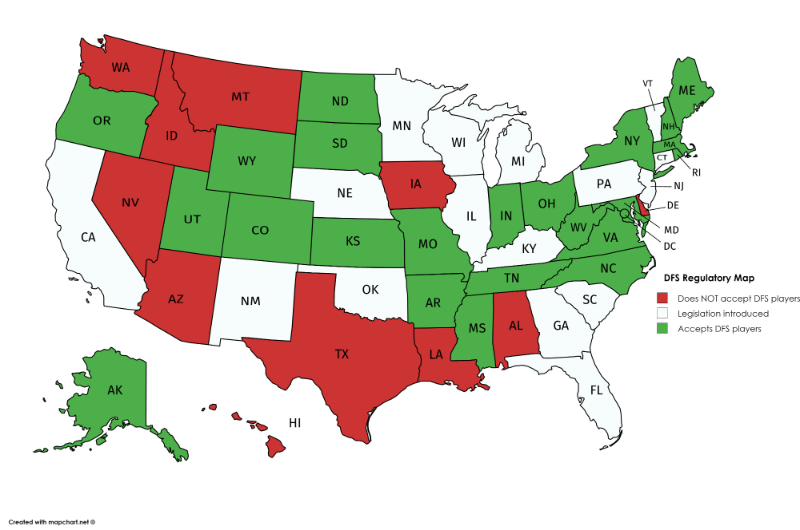States With Legalized Online Gambling
- There are three states that currently offer legal online gambling in the USA- Delaware, Nevada, and New Jersey. Delaware was the first state to legalize online gambling with the passage of the Delaware Competitiveness Act of 2012. All three states have regulated online poker and casino sites, however, the rules differ slightly.
- The passing of legal sports gambling in the three states is a big development for the gambling industry where studies have shown an estimated 35 million Americans will place an online bet on.
You might be wondering what states will legalize online gambling in 2020, and you have a couple of different states that have a high likelihood of legalizing it in the coming year. Some of the states with the most potential for legalizing online gambling include Illinois, Michigan, New York, Massachusetts, West Virginia, Louisiana and New Hampshire.
Online gambling is made legal the same way any other kind of gambling is made legal in the United States. A state government passes a bill to allow certain kinds of games to be played online. Those games are then regulated the same way as the games at a land-based casino would be.

The Reasons for This Prediction
A few different reasons exist for why people believe that online gambling laws in these states might change with the coming year. First, some of these states expressed an anxiousness to legalize sports betting. While some of the states only had an interest in legalizing sports betting, you had other states will to extend this even beyond sports betting. The legalization could get extended to casino games and poker. Because of this, you could see other states willing to imitate the success of other states. One of the great advantages of allowing for online gambling comes from the fact that the government can tax it and create a new form of revenue.

What Will We See in 2020?
With 2020 here, we can try to figure out what will happen in the coming year. You have a few different possibilities, but we will likely continue to see a trend of legalization among the states. In 2019, you had two other states that joined the online gaming market, and we will most likely see the same in 2020. The internet gaming revenue in Pennsylvania and New Jersey have both shined as a beacon of reason for legalizing online gaming. More states will most likely follow the trend.
Michigan and West Virginia have already begun drawing up a framework and system for issuing licenses to the different casinos. This could have a domino effect where other states see the effectiveness in it and choose to take part in it as well.
Online poker fans continue to hope that their state will legalize online gaming. They remain hopeful for these new developments. New York could be a big one that we see legalize online gaming in 2020. Part of this comes from how they have had issues with their land-based casinos, and they may want to provide online gambling as a way of competing with the neighboring state New Jersey. In general, lawmakers have also shown a tendency for supporting the legalization of online poker. That's good news for anyone who loves playing poker.
By
After New Jersey legalized and launched regulated online gambling in 2013, industry analysts thought more states would join the group that already included Nevada and Delaware. While they were correct that many states did consider online poker and gaming legislation, none of those states were able to push the bills over the finish line until late 2017 when Pennsylvania finally did it.
Online poker has proven more difficult an issue than most anticipated. Some states, like California, have considered online poker only, but even as a widely-recognized skill game, online poker was unable to find agreement among all parties in 10 years of consideration.
Most other states have put forth bills with online poker and casino games together, sometimes also paired with daily fantasy sports, because online poker has proven not to be a significant revenue generator on its own (ahem, Nevada). But New Jersey showed that a combined online gaming regime partnered with land-based casino properties was a winning match and has not only helped the entire gambling industry but also seen notable year-on-year growth since its launch. But putting online gaming in front of legislators raises many questions – some moral and others social – that complicate the issue and prevent much forward movement on legalization.
With that said, some lawmakers are absorbing facts and getting educated about the benefits of the industry, mostly courtesy of the stellar example that the New Jersey market has been. And with that in mind, there are some states that are on our watch list for passing 2018 online poker legislation.
Michigan
A state that was considered an underdog until about one year ago is now a top contender to legalize and regulate online poker and casino games in 2018. State Senator Mike Kowall spent time over the last two years garnering support for his bills but ran into conflicts with the state’s tribes. He has been working closely with them for several months to find compromise in order to move forward.
Meanwhile, State Representative Brandt Iden introduced HB.4926 in 2017 and quickly pushed it into a committee hearing in order to start discussions. His optimism has been refreshing, but he is likely running into the same problems as Kowall. His hopes for moving his bill this year are fading as the holidays approach, but he is very likely to continue to pursue his online gaming goals in early 2018.
New York

What States Have Online Gambling
While on the list of serious possibilities for online gaming over the past few years, New York continues to run into problems with State Assemblyman J. Gary Pretlow. Though he has been a sponsor of bills in years past, he has also been the one to stop pursuing them in the latter months of each year due to issues that come to his attention. He has now expressed concerns about the land-based casinos that began operations this year, as their initial revenue numbers have been short of their projections. None of this bodes well for his support of online gambling.
Pretlow from New York: I'm waiting to see how our states' new land-based casinos will do, before jumping into Internet gaming. #igna2015
— Traffic Generation (@Traff_Gen) April 14, 2015
State Senator John Bonacic has been a staunch supporter of online gambling and pushed his bills to passage in the Senate in 2016 and 2017. If he can find a different assemblyman to champion the issue in the other half of the legislature in 2018, there is a good chance that the state will come through. The brick-and-mortar casinos are already struggling to meet their goals, so they will likely help push for online gambling as a revenue booster.
Illinois
In a somewhat surprising move, Illinois had many believing it was close to legalizing online gaming in 2017. In May, the Illinois Senate voted on and passed S.208, a bill to legalize and regulate the games and daily fantasy sports by 42-10. The companion bill in the House, H.479, got stuck in a committee and scheduled hearings never materialized. The bill then came up during the October veto session for consideration but stalled there as well.
Not surprising (online poker is in here too), but this doesn't mean the effort in Illinois is dead. https://t.co/VFfTkFuQPy
— Dustin Gouker (@DustinGouker) November 10, 2017
The good news is that H.479 is still open going into the next session that begins in January, which means no new bills need be introduced. Talks can continue behind the scenes through the next several months, and the committee can schedule a new hearing in early 2018. Since sponsor Representative Michael Zalewski has expressed optimism about the notion of a comprehensive gambling expansion bill to be put forth in 2018, this state will be one to watch closely.
New Hampshire
As New Hampshire finds success from its online lottery sales and watches neighboring New Jersey (and soon Pennsylvania) reap the revenue benefits from online gaming, it is likely to consider legislation again in 2018. Efforts began early in 2017 but never with the seriousness required to educate legislators. The three state representatives who sponsored H.562 this year have another opportunity for hearings and debate in 2018, if they push for debate and consideration early. While H.562 was voted inexpedient to legislate by a unanimous 23-0 vote in late October, this simply indicates that more information is needed in the coming months.
There is a good chance that New Hampshire strongly considers a new bill in 2018.
West Virginia
Several West Virginia delegates expressed support for online gambling in 2017. A group of them sponsored H.3067 in March of 2017 to authorize online gaming via partnerships with the state’s racetracks, but the bill failed to garner the necessary support to move forward. But Delegate Shaun Fluharty, the original sponsor of the legislation, pushed hard and even found support from the director of the West Virginia Lottery Commission. And after Pennsylvania passed its bill in October, Fluharty took to social media to express his desire to see his state follow suit.
With PA passing sports betting, online poker and daily fantasy legislation today, WV must act this session or be left in the dust. #wvpol
— Shawn Fluharty (@WVUFLU) October 26, 2017
While that did not happen this year, there is a high possibility that Fluharty will wrangle support over the winter legislative break and try again in early 2018. He wants to compete with neighboring states on the East Coast, and he understands well the benefits that await his state.